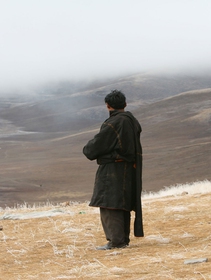
The tale of the disappearing vultures
Vulture populations in southern Asia experienced a 99% collapse and for a long time nobody knew why. Then, a historic discovery saved them.
Stella Levantesi
Contributor
As a journalist and photographer, I travel the world in search of stories to tell. Born and raised in Rome, I live between Italy and New York where I obtained my degree at New York University’s school of journalism. Words and images are part of my storytelling narrative: from my experience with the mountain gorillas in Uganda, to the destruction of native lands in the US plagued by Trump’s anti-environmental agenda, and again, from the struggle of a mother with opioid use disorder in New York’s most drug-ridden neighbourhood, to the social and environmental crisis of those Caribbean islands wiped out by violent hurricanes. I believe in the power of stories that go beyond the predictable, stories that are able to offer new and unusual perspectives even for the most commonly recurring issues in the media. I’ve worked with the BBC, Il Manifesto, Internazionale, the Bureau of Investigative Journalism in Puerto Rico, NBC and others. Travelling, nature and good food take care of my body and my soul.
Favourite quote
“And those who were seen dancing were thought to be insane by those who could not hear the music” (Friedrich Nietzsche)
Vulture populations in southern Asia experienced a 99% collapse and for a long time nobody knew why. Then, a historic discovery saved them.
A group of experts in Tokyo suggested pouring radioactive water from Fukushima into the open sea. A marine biochemist explains the consequences of this absurd decision.
We talk to Shaama Sandooyea, activist and marine biologist from Mauritius onboard Greenpeace’s Arctic Sunrise ship in the heart of the Indian Ocean.
Only two northern white rhinos remain, and both are females, but scientists have created two new embryos to save the species, for a total of five.
Ecocide is a crime against the Earth and, therefore, human beings. The battle to recognise environmental offences as international crimes continues.
Who started the Sunrise Movement in the United States, committed to climate change action and a Green New Deal – as well as a sustainable future.
A thousand elephants could die of starvation in Thailand as the camps where the animals are exploited for tourism have had to close due to Covid-19.
Time magazine’s 100 Women of the Year project sheds light on influential women’s stories, from Amelia Earhart to Greta Thunberg. A selection of some of the greats for International Women’s Day.
What does it mean to live in the “climate moment”? How did we get here? Is it too late to change? Naomi Klein, Alexandria Villaseñor, Joëlle Zask and Bill McKibben discuss these vital questions at the Albertine Festival in New York City.
Thirty years ago, Bill McKibben alerted us to the threat of climate change. In 1989 he published his groundbreaking book, The End of Nature, which was considered the first book on climate change for the general audience. Today, he broadens his warning. Humans have now emerged as a “destructive geological force”, he writes in his
Greta Thunberg and hundreds of thousands of young activists, together with many adults, poured onto the streets of New York City to strike for the climate on 20 September. One of the largest mobilizations for climate action in history was an intergenerational call to fight for the planet.